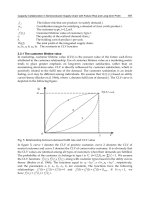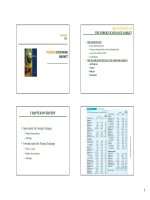Lecture supply chain management chapter 6 measuring performance sc
Bạn đang xem bản rút gọn của tài liệu. Xem và tải ngay bản đầy đủ của tài liệu tại đây (1.51 MB, 13 trang )
4/13/20
Chapter 6: Measuring
performance SC
Lecturer: Bui Thi Bich Lien
LOGO
MsC. Bui Thi Bich Lien
Contents
1
Introduction
2
Logistics performance evaluation of Coyle
3
Logistics performance evaluation of Lambert
4
Logistics performance evaluation of M. Hugos
MsC. Bui Thi Bich Lien
MsC. Bui Thi Bich Lien
1
4/13/20
Learning objectives
vDefine a concise set of metrics for measuring
the performance of a company’s supply chain
operations
vUse performance data to spotlight problems
and opportunities
MsC. Bui Thi Bich Lien
1. Introduction
vTo get the performance desired from supply
chains requires a company to monitor and control
its operations on a daily basis.
MsC. Bui Thi Bich Lien
MsC. Bui Thi Bich Lien
2
4/13/20
A Good Measure
MsC. Bui Thi Bich Lien
2. Logistics performance evaluation of Coyle
vQuality
vCost
vTime
vOther/supporting
MsC. Bui Thi Bich Lien
MsC. Bui Thi Bich Lien
3
4/13/20
2.1 Quality
v Overall customer satisfaction
v Processing accuracy
v Perfect orders fulfillment
§ On time delivery
§ Complete order
§ Accurate product selection
§ Damage free
§ Accurate invoice
§ Forecast accurate
v Planning accuracy
§ Budgets and operating plans
§ Schedule adherence
MsC. Bui Thi Bich Lien
2.2 Cost
v
v
v
v
v
Finished goods inventory turns
Days sales outstanding
Cost to serve
Cash to cash cycle time
Total delivered cost
§ Cost of goods
§ Transportation costs
§ Inventory carrying costs
§ Materials handling costs
v All other costs
§ Information systems
§ Administrative
v Cost of excess capacity
v Cost of capacity short fall
MsC. Bui Thi Bich Lien
MsC. Bui Thi Bich Lien
4
4/13/20
2.3 Time
vOrder cycle time
vOn-time delivery/receipt
vOrder cycle time variability
vResponse time
vForecasting/planning cycle time
MsC. Bui Thi Bich Lien
2.4 Other/supporting
vApproval exceptions to standard
§ Minimum order quantity
§ Change order timing
vAvailability of information
MsC. Bui Thi Bich Lien
MsC. Bui Thi Bich Lien
5
4/13/20
3. Logistics performance evaluation of Lambert
vCustomer satisfaction
vCustomer value-added
vTotal cost analysis
vProfitability analysis, includes revenue
considerations
vStrategic profit model
vShareholder value
MsC. Bui Thi Bich Lien
4. Logistics performance evaluation of Michael Hugos
vCustomer service
vInternal Efficiency
vDemand Flexibility
vProduct development
MsC. Bui Thi Bich Lien
MsC. Bui Thi Bich Lien
6
4/13/20
4.1 Customer service
vCustomer satisfaction:
§ Responsiveness
§ Efficiency
vCustomer service evaluation indicators:
§ BTS
§ BTO
MsC. Bui Thi Bich Lien
4.1 Customer service
BTS
BTO
- Complete order fill rate
- Customers response time
- On time delivery rate
- On time delivery rate
- Value of total back orders and
number of back orders
- Value of late orders and number
of late orders
- Frequency and duration of back
orders
- Frequency and duration of late
orders
- Return rate
- Number of warranty returns and
repairs
MsC. Bui Thi Bich Lien
MsC. Bui Thi Bich Lien
7
4/13/20
Customer service: some KPI
Order entry
accuracy
Orders entered exactly as specified by the customer/total
orders entered
Order status
communication
accuracy
Orders for which order status is communicated
correctly/total orders with status communication request
Invoice
Accuracy
invoices with perfect match of items, quantities,
prices/total invoices
MsC. Bui Thi Bich Lien
4.2 Internal Efficiency
vThe ability of a company or a supply chain to use
their assets as profitably as possible.
vAssets include anything of tangible value such as
plant, equipment, inventory, and cash
vPopular measures of internal efficiency are:
üInventory value
üInventory turns
üReturn on sales
üCash-to-cash cycle time
MsC. Bui Thi Bich Lien
MsC. Bui Thi Bich Lien
8
4/13/20
vInventory value:
§ to match inventory availability (supply) with sales
(demand) and not have excess inventory left over
§ let inventory exceed sales is in a growth market
where the value of the inventory will increase
vInventory turns (T&E-turn and earn):
§ measure the profitability of inventory by tracking
the speed with which it is sold or turned over
during the course of a year
§ Turns = Annual Cost of Sales / Annual Average
Inventory Value
MsC. Bui Thi Bich Lien
Inventory Turns
Turns
Average
inventory
Inventory
carrying cost
(1) = i
VND (2)
VND (3)
1
2
3
4
5
6
7
8
9
10
150,000,000
Incremental
savings in
carrying costs
(tiết kiệm tăng
dân
VND (4)
Cummulative
saving in
carrying cost
(tiết kiệm luỹ
tiến)
VND (5)
Assuming: ICC (inventory carrying cost) = 30% average inventory=> ICC (turn 1)= average
inventory * 30% = 150 000 000 * 30% = 45 000 000
MsC. Bui Thi Bich Lien
MsC. Bui Thi Bich Lien
9
4/13/20
Return on sales
vReturn on sales: how well an operation is being run. It
measures how well fixed and variables costs are
managed and also the gross profit generated on sales
§ Return on Sales = Earnings before Interest & Tax /
Sales
§ The higher the ROS the better.
§ There are times though when a company may
deliberately reduce this number in order to gain or
defend market share or to incur expenses that are
necessary to achieve some other business objective.
MsC. Bui Thi Bich Lien
Cash-to-cash cycle time
vThe time it takes from when a company pays its
suppliers for materials to when it gets paid by its
customers
§ Cash-to-Cash Cycle Time = Inventory Days of
Supply + Days Sales Outstanding – Average
Payment Period on Purchases
§ The shorter this cycle time the better.
§ Accounts receivable may be large due to late
payments caused by billing errors or selling to
customers who are bad credit risks..
MsC. Bui Thi Bich Lien
MsC. Bui Thi Bich Lien
10
4/13/20
v Inventory turns =
!"#$"&'""(##")(
*+,-.',.''-,'.$,+.)/,"&01+,1$"-2
v Average aggregate value of inventory = (average
inventory for item i)x(unit value item i)
v Days of supply =
*+,-.',.''-,'.$,+.)/,"&01+,1$"-2
34565478449554:9
;<=9>?5
MsC. Bui Thi Bich Lien
vCost of goods sold: $ 425 million
vProduction materials and parts: $4,629,000
vWork in process: $17,465,000
vFinished goods: $12,322,000
vInventory turns?
vDays of supply?
MsC. Bui Thi Bich Lien
MsC. Bui Thi Bich Lien
11
4/13/20
4.3 Demand Flexibility
vActivity cycle time: the amount of time it takes to perform
a supply chain activity such as order fulfillment, product
design, product assembly, or any other activity that supports
the supply chain
vUpside flexibility: the percentage increase over the
expected demand for a product that can be accommodated
vOutside Demand flexibility: the ability to quickly provide
the customer with additional products outside the bundle of
products normally provided
MsC. Bui Thi Bich Lien
4.4 Product Development
v Measures a company or a supply chain’s ability to design,
build, and deliver new products to serve their markets as
those markets evolve over time.
v Technical innovations, social change, and economic
developments cause a market to change over
§ Percentage of total products sold that were introduced in the
last year
§ Percentage of total sales from products introduced in the last
year
§ Cycle time to develop and deliver a new product
MsC. Bui Thi Bich Lien
MsC. Bui Thi Bich Lien
12
4/13/20
www.themegallery.com
LOGO
MsC. Bui Thi Bich Lien
MsC. Bui Thi Bich Lien
13









